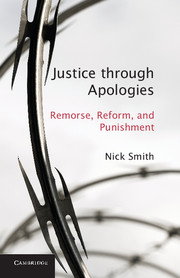Book contents
- Frontmatter
- Contents
- Acknowledgments
- Introduction
- 1 The Categorical Apology Revisited
- Part One The Penitent and the Penitentiary: Apologies in Criminal Law
- Part Two Apologies in Civil Law
- 4 The Institutional Framework: Economic Outcomes and Noneconomic Values
- 5 A Practical Framework for Evaluating Apologies in Civil Contexts
- Concluding Call for Collaboration
- Notes
- Index
5 - A Practical Framework for Evaluating Apologies in Civil Contexts
Published online by Cambridge University Press: 05 June 2014
- Frontmatter
- Contents
- Acknowledgments
- Introduction
- 1 The Categorical Apology Revisited
- Part One The Penitent and the Penitentiary: Apologies in Criminal Law
- Part Two Apologies in Civil Law
- 4 The Institutional Framework: Economic Outcomes and Noneconomic Values
- 5 A Practical Framework for Evaluating Apologies in Civil Contexts
- Concluding Call for Collaboration
- Notes
- Index
Summary
Guiding Questions: How Should We Evaluate Apologies in the Civil Context?
Apologies in civil and criminal law share many features. Notice a few distinctions. First, in criminal matters the state – for better or for worse – typically holds the authority to determine how much punishment an offender deserves and how an apology does or does not impact that punishment. Even though contemporary justifications for punishment rest on deeply conflicted foundations and lack coherent objectives, the state dominates the discussion regarding justifications for punishment. I argue that the state should apply apology reduction in criminal cases. In civil matters, by contrast, injured parties typically have exclusive control over the sorts of meanings they seek from an apology, whether they believe the offender satisfied those expectations and how those meanings or lack of meanings impact the dispute. A seriously injured party in a civil matter can decide not to pursue legal recourse if she finds the offender sufficiently apologetic, but in criminal cases the state will usually prosecute its case regardless of the victim's sentiments concerning remorse or forgiveness. Just as the state's discretion in criminal matters presents various challenges and opportunities, I hope to identify various points where injured parties should be aware of their options as well as the potential advantages and disadvantages of such freedom. In general, I hope the following discussions allow victims to understand better what they seek from apologies and to evaluate the apologies they receive accordingly. The four corners of apologies offer touchstones throughout this process: Did the offender explain what happened with sufficient detail, accept blame as deserved, not reoffend, and provide appropriate redress?
- Type
- Chapter
- Information
- Justice through ApologiesRemorse, Reform, and Punishment, pp. 259 - 329Publisher: Cambridge University PressPrint publication year: 2014

